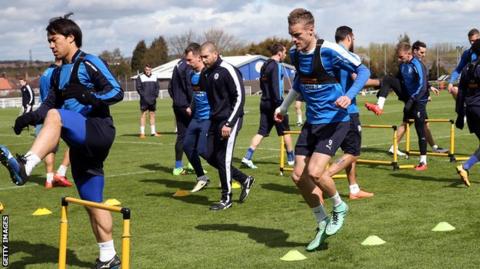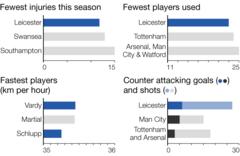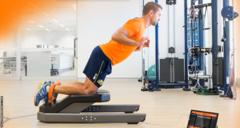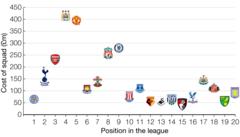http://www.bbc.com/sport/football/36189778
- From the section Football

Everyone loves a fairytale, but how many do you know that involve beetroot shots and ice chambers reaching -135C?
As much as Leicester City's transformation from relegation favourites to Premier League champions has been cast as fantasy football, the reality is a lot more calculated. Diligent owners, resourceful scouting and an effervescent manager have played a telling part. But an innovative sports science and medical team, carefully integrated into the decision-making process, has created a perfect model for success.
Leicester are not alone in using cutting-edge technology in the Premier League, of course, but using beetroot shots as a performance enhancer and ice chambers to improve recovery do mark them out from the crowd.
The key difference is how manager Claudio Ranieri includes them in his plans. As former Liverpool fitness and conditioning coach Darren Burgess told BBC Sport: "Quite often, the coaches don't listen."
The result? A team that has suffered the fewest injuries, according to Physioroom.com, and used fewer players than any other Premier League club this season. Perfect for a team with relatively limited resources that employs a fast counter-attacking game.

So many sprints but so few injuries
When Ranieri was appointed last summer, the club's owners made it clear the backroom staff he inherited from previous boss Nigel Pearson were to be trusted. "He was quite taken aback with how we work the players here," said assistant manager Craig Shakespeare.Already influential under Pearson, the staff have proven even more important for a Ranieri team built on speed. According to Opta, the champions have made more counter-attacks and scored more counter-attacking goals than any other team this season.
To do this, the players must be conditioned to perform sprints on a regular basis without their bodies breaking down. Striker Jamie Vardy, who has recorded the fastest speed in the Premier League this season - 35.44 km/h - and can perform up to 500m of sprints in every game, is a prime example.
First they must build hamstring strength, which they do using a custom-built leg press on which they can lift 350-500kg. They also use a piece of equipment called a NordBord, which allows them to improve and measure hamstring strength, sometimes even doing post-match exercises on it in the dressing room.
| Leicester's sports science staff | |
|---|---|
| Paul Balsom: Head of sports science and performance analysis | Andrea Azzalin: First-team science and conditioning coach |
| Matt Reeves: Head of fitness and conditioning | Tom Joel: First-team sports scientist |
| Mitch Willis: Strength and power coach | Christopher Rosimus: Performance nutritionist |
| Ken Way: Performance psychologist | Dave Rennie: Head physiotherapist |
So typically on a Thursday, when players might be tired after training, they are lined up to do a 40m sprint. It may sound like a recipe for injury but is exactly the opposite. Without that exposure, players are at risk on match days, and Leicester's lack of soft-tissue injuries would suggest it is a method that works.
Then there is the beetroot juice. According to scientists at the University of Exeter, drinking it improves sprint performance and decision-making.
Although the study found improvements were relatively low at 3.5%, even a marginal gain like this might be enough for the likes of Vardy to reach a cross before a defender.

Control freaks
Leicester's early exit from cups this season, allied to a lack of European football, has given their sports scientists an added advantage over other top teams in that they can plan the week's training with a high degree of control.It also means players do not train too much and risk injury. That might sound obvious, but Leicester's decision to include a 48-hour recovery process after games, and have another day off in midweek, is a schedule not always followed by other clubs.
Everything is monitored, including the density of the pitch to see if it is too hard or soft, with the length of the session adapted accordingly. Player movement, meanwhile, is recorded through Catapult GPS vests, which show how far they run, the level of intensity, acceleration, deceleration, and changes of direction.
If explosive players such as Vardy have trained too hard and need to be pulled out of certain sessions, Ranieri is willing to listen to the experts around him.
"Some managers get good results without resorting to this type of screening," Burgess said. "But you can't help but be aided by good data to help manage players, particularly if they are playing a high-pressing game."
Added to this objective data, Leicester's players also complete a daily questionnaire on an iPad. They are asked how their bodies feel after the previous day's training so if several make a similar complaint of slight muscle soreness in their quadriceps, for example, the team can adjust the session next time to avoid a similar problem.
The questionnaire also asks how the player slept and whether they were disturbed in the night, all so they can adapt what they eat and drink to ensure they get the best rest possible.
"You can get carried away with all the objective information, so sometimes you can't beat just asking a player how they are feeling," Reeves said. "We take a very holistic approach and try to make it more personal by having key understanding of each individual."

Space-age recovery
When Vardy injured his hip in November, it looked as though his run of goals in consecutive games might come to an end. The fact he continued to play was down to a cryotherapy ice chamber, in which players are exposed to temperatures of -135C for up to four minutes."It's absolutely freezing but it helps you in your recovery, so fair play to the club for getting it," said Vardy. "I don't think even some of the brainiest men in the world would understand the name of the stuff they've been doing but they've been working on me all week."
The chamber works in a similar way to an ice bath, with blood withdrawn back to the heart before new oxygenated blood flushes into the player's muscles. Because it affects the whole body, Leicester's head physio Dave Rennie says it is far more effective, particularly when there is little time between games.
"The players like it because it's a dry ice so not as harsh on the skin as ice baths," Reeves said. "The players will often walk down the corridor afterwards looking light on their feet and feeling good in themselves. It also has a knock-on effect with sleep for that evening and the following evening."
Leicester's medical team also speed up the recovery process by using bags full of ice to massage their players. "It sounds freaky but it lowers the body temperature and gives the same stimulus as a massage while providing a nice big red patch on the players' skin," Reeves added. "In the players' minds there is a visual sign that the recovery process has started."
'The party's been on the training pitch'
Whether rewarding his team with pizza for clean sheets or silencing talk of the title until the last few games, Ranieri has been a master of keeping his players focused and united this season.Leicester's performance psychologist Ken Way told BBC Sport: "There are two psychologists at the club. One is me and the other is Claudio. The way he has spoken to the players has been exactly the same as when addressing the media. It's all about focusing on the process not the outcome, and some of the lines he uses leave my jaw on the floor."
Way credits Pearson for assembling the backroom team, which has fostered a culture where players are accountable for their own actions. Sprint scores are presented to the group en masse, midweek five-a-side tables are published and players watch clips of each other's performances.
"It's about empowering the players to make decisions for themselves rather than ruling over them," said Reeves. "It helps with the group culture and the fighting spirit."

The celebrations at Vardy's house once the title was won gave an insight into the bond that exists in the team. That is nothing new.
Way says big personalities such as Wes Morgan, Christian Fuchs, Robert Huth and Vardy have been essential to the team ethic, even if they enjoy belting footballs at each other on the training pitch or cracking eggs on each other's heads.
"The fans have been singing that Jamie Vardy's having a party all season, but even though they take their work seriously, it's been a party on the training pitch too, at times. Everyone has enjoyed the ride."

Will others follow Leicester's example?
GPS data, ice baths and sprinting are hardly revolutionary in a sport that now employs more sports scientists than ever.As Burgess points out, Sunderland boss Sam Allardyce carved out something of a niche in the field when he was in charge of Bolton, achieving four successive top-10 Premier League finishes between 2003 and 2007. This season, the Trotters were relegated to the third tier.
But while some clubs work in silos, Leicester's backroom teams have drawn together to help turn the club into winners, despite competing with clubs with far greater resources.
"It's a three-pronged approach of the sports science and medical teams, the coaching department and the players coming together with an understanding of what we are trying to achieve," said Reeves.
Burgess added: "Quite often sports science is not used to its full potential but we've seen the results at Leicester and I would be stunned if other teams don't jump on board.
"That's why I've been supporting Leicester like my first team. This is one of the biggest upsets in the history of world sport and, hopefully, it will change some of the beliefs in football about the impact good sports science can have."
